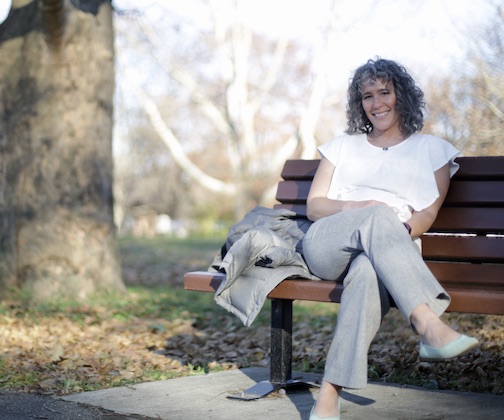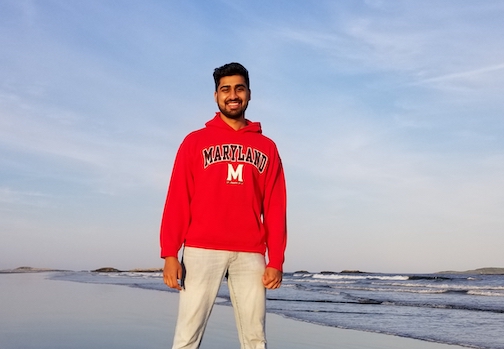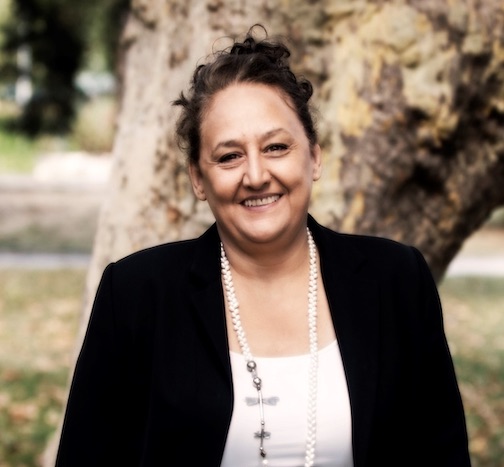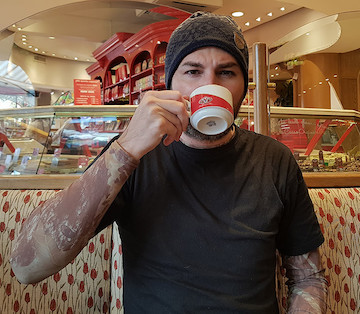Tell us about your background.
I was born in the coffee region in Colombia, in the city of Armenia Quindío. My father is an electronic engineer and my mother is a housewife, and my childhood was always centered around a very strong family bond and coffee cultivation. I studied psychology at the University of San Buenaventura in Medellín, then moved to Buenos Aires, Argentina to practice. My hobbies include shredding guitar, traveling, and enjoying nature.

Who are your patients in Buenos Aires?
When I started studying psychology, I fell in love with psychoanalysis, and currently work as a psychologist and psychoanalyst for various patient populations here in the city. I am an institutional psychologist for a nursing home called Santa María Josefa, where I am in charge of 60 residents and also work as a therapeutic companion for patients with mental disabilities. There I started a personal project called ArteMayor, which is focused on the use of art as a form of inclusion, social bond, and mental health improvement in private and institutional settings. I also have an office where I attend to private patients.
What do you do each day?
Well, each day starts when I drink my first cup of coffee early in the morning; it’s a ritual I’ll never be able to give up. From there, I go to my office where I check my agenda, catch up with medical records, and start working with my patients. In the mornings, I work in the elderly home Santa María Josefa, where I am in charge of the mental wellbeing of its residents. Every day, I make rounds where I look for symptoms of mental issues or discomforts and intervene in their improvement, working together with the medical team.
In the afternoons, I work as a therapeutic companion, where I am focused on the outpatient care of patients with mental illnesses. I work with them in their homes, workplaces, and other daily spaces to help them operate in those spaces and address the psychological symptoms that come from them. It’s very interesting, since it’s not within the framework of an office or an institution, but rather from the patient’s own daily work. And lastly, I see patients privately in my office.

Tell us more about how you partner with other medical professionals to treat your patients.
I work with a team called Ágora, where we have a mindset of working together to analyze cases and come up with the best plans of treatment. Talking with the team helps me realize how my patients relate in different ways to each of the professionals with whom they work, and how that can cause different effects or obstacles for therapy; it's very enriching.
How does your ArteMayor project help your patients?
Its inclusive model allows us to show the capacities of people in situations of social exclusion due to mental, medical, or cognitive suffering. I work with local artists to run workshops for our elderly patients, including ones with memory or verbal communication issues. The patients are so proud of the work they produce, and the work itself reminds our society that these patients still have the capacity to express themselves and create something beautiful.
Being a Colombian working in Argentina, what has been your experience of the diversity in psychology? How does your background affect your relationships with your patients?
Buenos Aires is the mecca of psychoanalysis in Latin America and in the world. I've met students and colleagues from all over the continent who come here to learn the teachings of Freud and Lacan, and many of them stay here to practice because of the positive culture of psychoanalysis. There's a great deal of diversity here, which means that patients meet a therapist from another country and don't have any measurable reaction to that fact.
What role does community have in our mental health and wellbeing?
We all constitute ourselves—our culture, our codes of values—through others. And we know that fundamental rights like family, decent housing, food, and education that are hugely important to our mental health and wellbeing often come from and are shared with communities. When I was doing work during university with homeless populations, I saw firsthand the mental issues and suffering that can result from lacking those fundamental rights. Of course, biological, genetic, and environmental factors are other sources of mental pathology, but community is paramount.
What's your favorite part of your work?
Offering a space where people can express things that they normally keep quiet, things that cause them discomfort and mental suffering, and see how they can overcome them and feel better.

And what is the most difficult?
I once heard a phrase that said “Physical illness is an attack on life, mental illness is an attack on freedom," and it's very accurate. Excessive medicalization, forced institutionalization, dispossession of fundamental rights, and discrimination of people with mental illnesses are the most difficult aspects of my work.
What's the best professional advice that someone's given you? What advice would you give to others?
“Know all the theories. Master all of the techniques. But as you touch a human soul be just another human soul,” is a quote attributed to Carl Jung that reminds us that regardless of the skills, professional titles, status, and experiences we've acquired, we must not forget our humanity in relation to one another. The empathy, warmth, and affection that facilitates connection with others should be at the core of our work.
More Stories from Kinnected

At times, it has been really frustrating to be a strategist and health communication professional and witness the lack of strategic planning and messaging that we have over the last two years.
-
3 years ago

"What many people miss is that emotional exhaustion among clinicians existed long before the pandemic."
-
4 years ago

"A lot of people argue whether technology is good for the future of humanity or bad. In my opinion, it is both - just as an herb could be a poison or a medicine."
-
4 years ago

